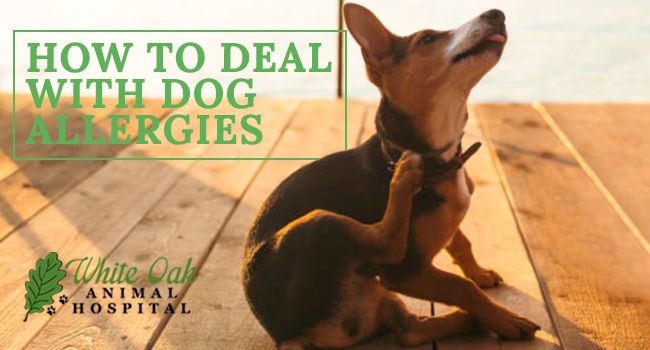
Dealing with dog allergies isn’t as complicated as it seems.
Once you and your veterinarian uncover the source of your pet’s allergies, allergy relief is easy to find.
The right medicine will alleviate your pet’s itching and scratching.
Their irritation will get better, and your pet will be back to its old self.
Your veterinarian can help you find the right combination of herbal or medical remedies for your pet’s allergy support.
How to Deal With Dog Allergies With Medicine
Because pet allergies are so common, many over-the-counter and prescription medicines exist to treat your pet’s allergy symptoms and underlying causes.
Steroids
Brand names for common steroids include prednisone, budesonide, and dexamethasone.
These medicines are typically administered as topical sprays.
A spray allows you to address specific areas such as between the legs or over the base of the tail.
Steroids are one of the most effective remedies for dogs suffering from allergies.
However, they must be administered judiciously.
Steroids have a bad reputation due to their side effects, which may include:
- Excessive thirst
- Increased urination
- Panting
- Weight gain
- Increased appetite
- Liver enzyme elevations
Budesonide has fewer side effects than other steroids.
Due to the side effects, steroids are best for acute allergy issues. Long term use typically leads to the common health problems mentioned above.
Antihistamines
Benadryl is the most common antihistamine.
Hydroxyzine is another antihistamine prescribed by veterinarians.
This treatment is best for acute allergies, as it doesn’t provide consistent relief.
Additionally, just like humans, dogs become lethargic when taking antihistamines.
The recommended dose is 1mg per pound of body weight, two to three times per day.
Immunotherapy
Immunotherapy includes a drug, such as cyclosporine, and treatments administered by dermatologists.
Cyclosporine, marketed as Atopica, is used for different immunosuppressive diseases.
Most dogs experience few side effects from this medicine.
It works best to treat dogs that itch and scratch.
If your pet has severe allergies, a dermatologist may recommend specific testing to determine the allergen affecting your dog.
The dermatologist will then formulate a specific injectable allergen extract, known as immunotherapy.
This treatment is one of the best for diagnosing and treating canine allergies.
However, some dogs are unresponsive to treatment.
Flea Control
Nexgard is a simple to administer chew.
It provides your dog with flea prevention for one month.
Give them to your pup every month to prevent fleas, even if they aren’t allergic.
Dog Owner Actions For Allergy Relief
Keeping your pet and your home clean can help alleviate allergies for you and your pet.
Dog Baths
Bathe your pup once a week during allergy season to get irritating pollen off their coat.
Additionally, bathing kills and prevents secondary bacterial and yeast infections.
Changes Around The House
- Wash dog beds in hot soapy water to kill dust mites. Dispose of foam or stuffed dog beds after a year.
- Don’t smoke in your home.
- Use a HEPA air filter to clean the air.
- Use a high-efficiency dehumidifier to keep humidity below 40%. Low humidity prevents dust mites, mold growth, and fleas.
Natural Dog Allergy Relief
Omegas, DHA and EPA help support the skin’s protective barrier.
They also aid in skin moisture retention and respiratory health.
If your dog’s skin and lungs are healthy and strong, they have a better defense against allergies.
Natural antioxidants help support a healthy immune system and assist in combating environmental pollutants.
Vet Classics Allergy Skin and Coat Soft Chews contain:
- Omega-3 Fatty Acids
- Turmeric Root
- Grape Seed Extract
- Quercetin
- Pumpkin Powder
- Bromelain
- EPA
- DHA
Vet Classics Allergy Skin and Coat Soft Chews help dogs suffering from allergies.